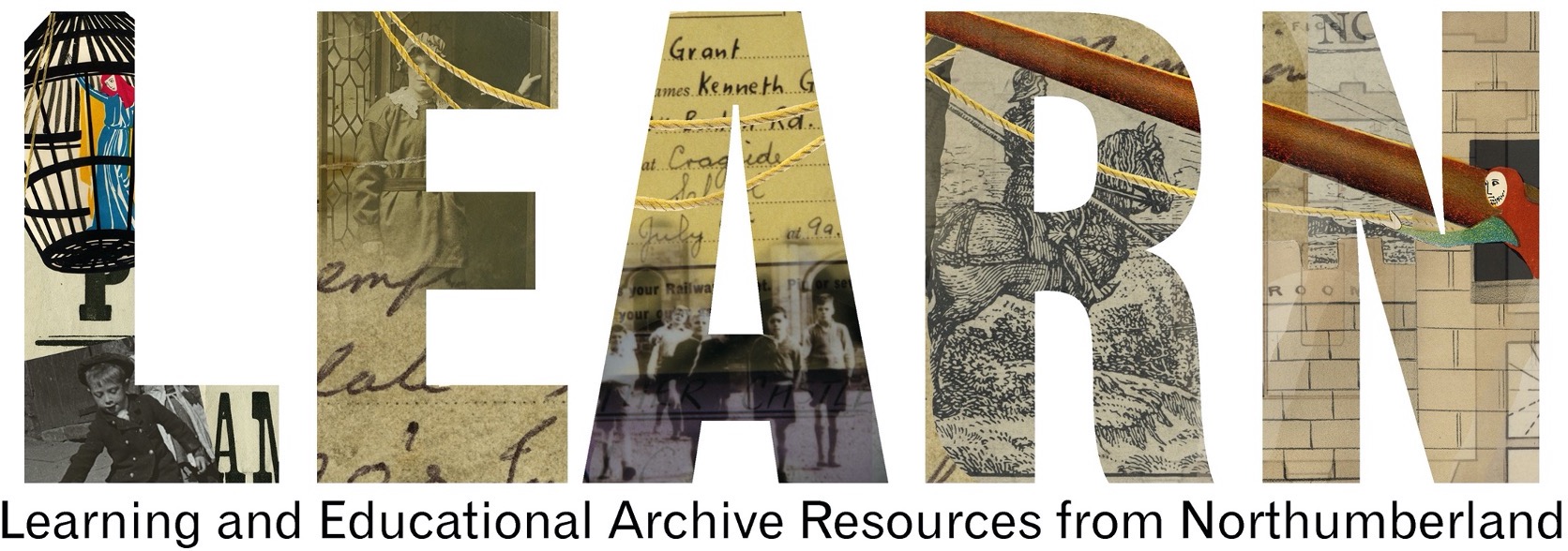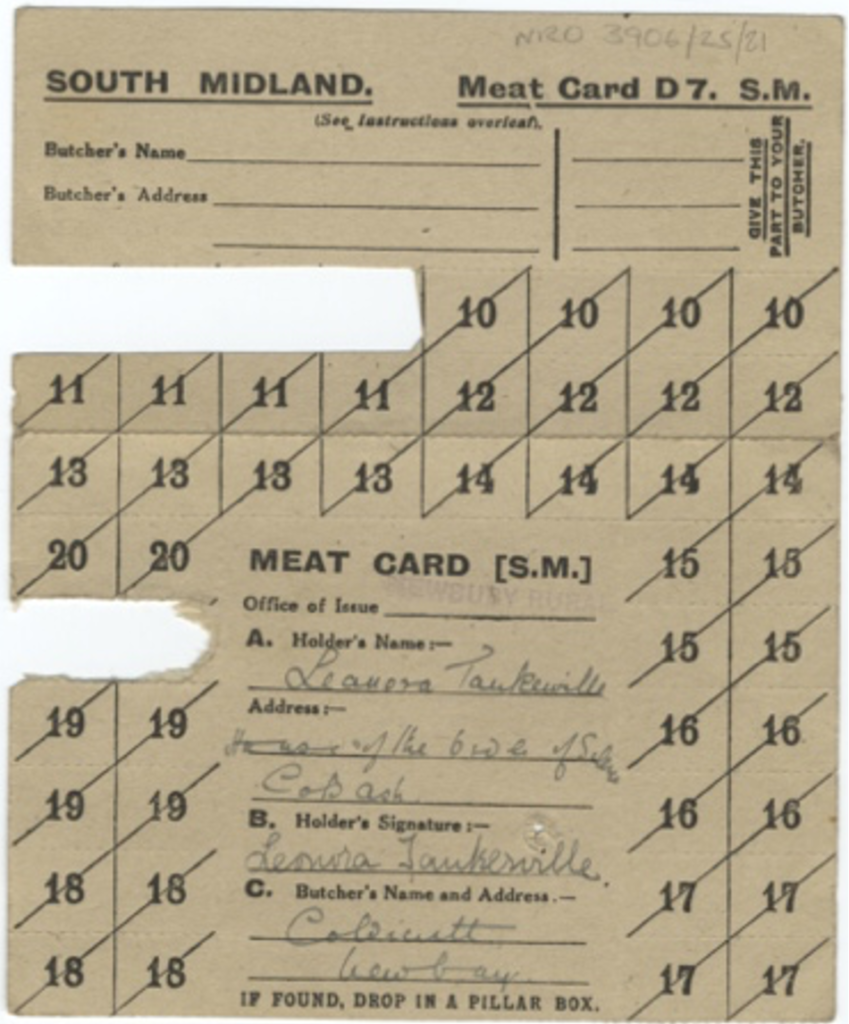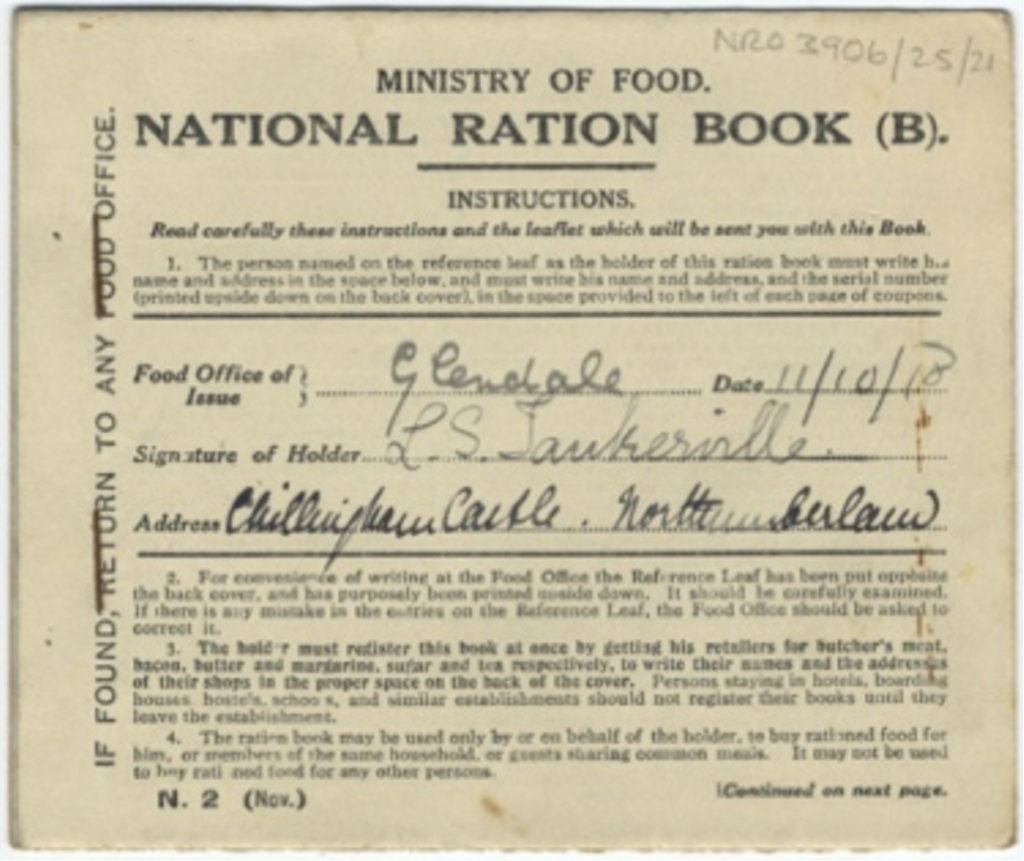Ration books and tokens, 1918
Reference: NRO/03906/25/21
Suggested age groups: KS1, KS2, KS3, KS4, lifelong learners
Subject areas: History, Maths, Literacy, Biology, Citizenship, Cookery, Art
CONTEXT
At the beginning of the war Britain imported about 60% of its food from abroad.
Conscription meant that men between the ages of 18 and 41 had to join the army from 1916. Farmers and other food producers could be excused from service (exempt), but they had to make their case at Military Service Tribunals.
On 1 Feb 1917 Germany declared unrestricted submarine warfare. This meant that they would bomb any ships from enemy countries; not just military vessels.
In January 1918, the Ministry of Food (which the government set up during the war) introduced rationing of certain food stuffs. A ration book, like this one, was needed to buy meat, butter and sugar. Other restrictions were put on bread. An order from the Ministry in 1917 meant that bakers were not allowed to sell fresh bread; it had to be at least 12 hours old.
ACTIVITIES
ACTIVITY 1
Background
In January 1918, the Ministry of Food (which the government set up during the war) introduced rationing of certain food stuffs. A ration book, like this one, was needed to buy meat, butter and sugar. Other restrictions were put on bread. An order from the Ministry in 1917 meant that bakers were not allowed to sell fresh bread; it had to be at least 12 hours old.
SEE
See: What is rationing?
See: When was rationing introduced during WW1?
See: Who introduced rationing during WW1?
See: What was a ration book needed to buy?
See: What did a Ministry order prevent bakers from doing?
See: Whose ration book is in the image?
See: What was their address?
THINK
Think: Why was rationing needed during WW1?
Think: Did rationing affect everyone? You could look up Leonora Tankerville who the pictured ration book belongs to, and her home Chillingham Castle. Think about her social class.
Think: Why was fresh bread banned?
Think: Who produced the food in Britain during the war once conscription had been introduced and many men had joined the armed forces?
Think: What types of foods do you think Britain imported and where do you think they imported them from?
DO
Do: Create a map diagram showing the foods that Britain imported and where it was imported from.
Do: Think about the area you are in. Note down any land that you think could be turned into allotments if rationing was introduced again.
Do: Either in person or by using a map, measure the area in square metres, or square kilometres, the land you could turn into an allotment.
Do: Choose some crops that were commonly produced during WW1. Using your calculation of the area of land for your allotment, how many of each crop could you produce? Think about the size of each crop.
Do: Using information from the Office of National Statistics, work out how many people would rely on food from the land you have chosen to turn into an allotment. Think about how big the land is, people’s proximity to the land, and other areas nearby that could be turned into allotments that they could access.
Do: Using your calculations of the number of crops you could produce and the amount of people the allotment would serve, how well could you feed the people and for how long? Think about daily calorie intakes, the nutritional values of different foods, the amount of labour you would need, and the time it would take the crops to grow.
Do: Create a propaganda poster to promote rationing.
Do: Have a go at making some of the WW1 recipes from the Great Food Club website. The recipes come from the First World War’s Food Economy Campaign with the approval of The Ministry of Food and are designed to encourage people at home to save bread and ration food.
Resources
http://www.gogmsite.net/belle-epoque-pouter-pigeon/subalbum-countess-of-tanker/
https://www.greatfoodclub.co.uk/blog-my-win-the-war-cook-book-menu/
https://www.nhs.uk/common-health-questions/food-and-diet/what-should-my-daily-intake-of-calories-be/
https://www.nhs.uk/common-health-questions/food-and-diet/what-should-my-daily-intake-of-calories-be/
https://www.bbc.co.uk/bitesize/topics/zqhyb9q/articles/z8kv34j
ACTIVITY 2
Background
At the beginning of the war Britain imported about 60% of its food from abroad. On 1 Feb 1917 Germany declared unrestricted submarine warfare. This meant that they would bomb any ships from enemy countries; not just military vessels.
SEE
See: How much food did Britain import from abroad at the beginning of the war?
See: When did Germany declare unrestricted submarine warfare?
See: What is unrestricted submarine warfare?
See: How did unrestricted submarine warfare affect Britain’s access to food?
THINK
Think: Are there rules in warfare?
Think: What does jus in bello mean?
Think: What types of rules should there be in warfare?
Think: What are the Geneva Conventions and what do they say?
Think: Which rules were in place during WW1?
Think: Read the National Geographic article on Hunger and War. When did the United Nations condemn the use of starvation in warfare? Why do you think they condemned it at the time they did? What are your thoughts on this?
DO
Do: Create a diagram of the four Geneva Conventions showing the date they were introduced and a brief overview of the warfare rules they made.
Do: Watch the BBC Teach YouTube video about food shortages, submarine blockade and rationing. Note down any ways that Britain and Germany tried to win the war using food. Write a reflective statement about your thoughts on this warfare tactic.
Do: Compare the notes you made while watching the BBC Teach video to your Geneva Convention diagram. Did Britain and Germany do anything that would have been in breach of these rules? Think about this from a 1918 perspective and a present-day perspective.
Do: In groups debate whether or not it was right for Britain and Germany to use access to food as a way to win WW1.
Resources
OTHER ONLINE RESOURCES
BBC Bitesize website, page about rationing and food shortages: https://www.bbc.co.uk/bitesize/topics/zqhyb9q/articles/z8kv34j
YouTube website (BBC Teach), video about food shortages, submarine blockade and rationing: https://www.youtube.com/watch?v=aEwrmeMSeWQ
Imperial War Museum website, page about rationing and foot shortages: https://www.iwm.org.uk/history/rationing-and-food-shortages-during-the-first-world-war
Spartacus Educational website, page about rationing: https://spartacus-educational.com/FWWrationing.htm
The National Archives website, page for “Great Wharton” a fictional WW1 town. Interactive map with links to Home Front stories: https://www.nationalarchives.gov.uk/first-world-war/home-front-stories/#
The History Press website, page about food shortages and rationing (including posters): https://www.thehistorypress.co.uk/articles/bread-a-slice-of-first-world-war-history/




